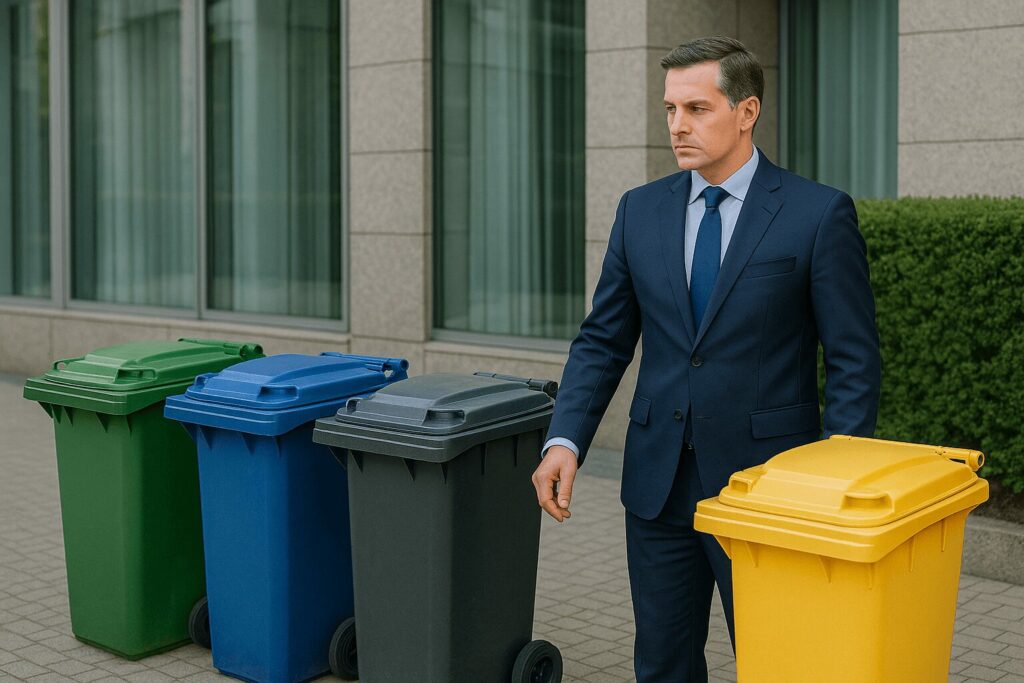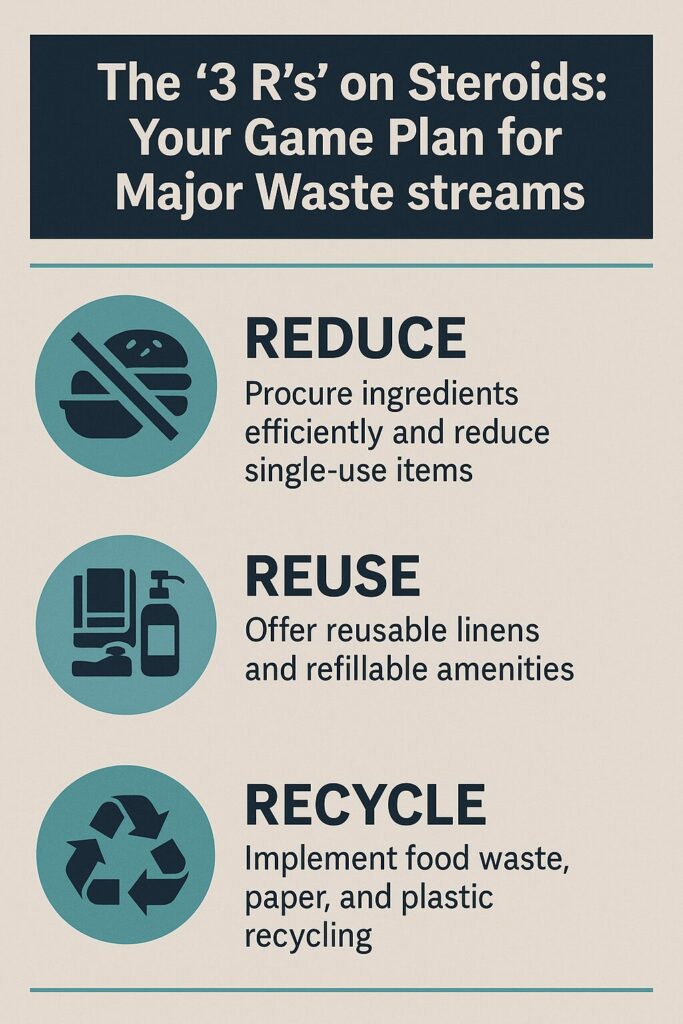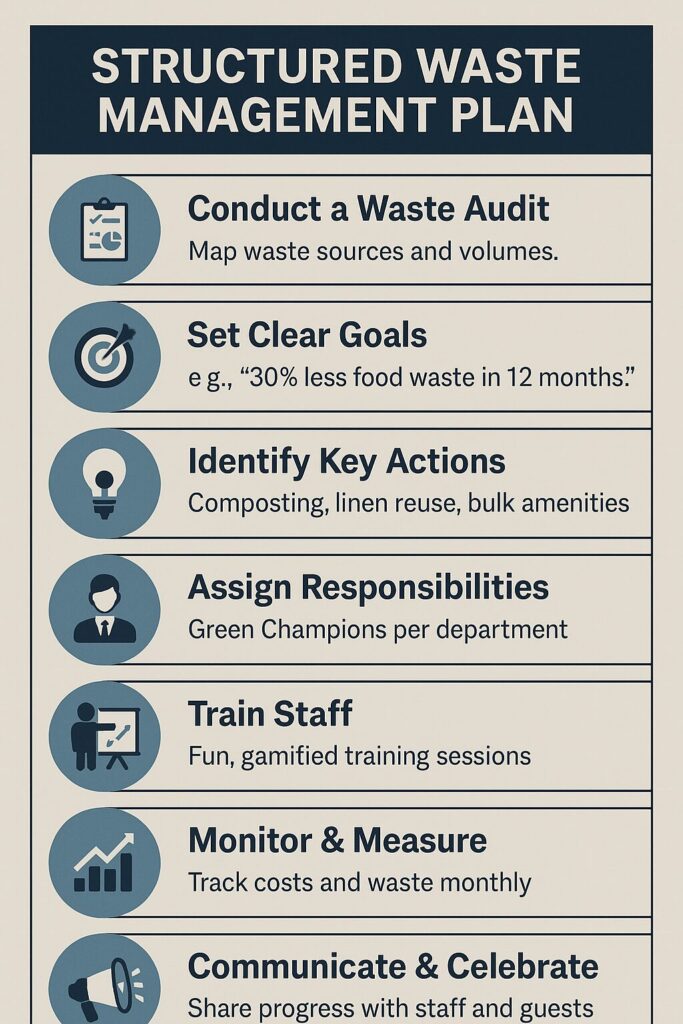
Hotel waste management tips: Cut costs & wow guests
How do you manage hotel waste and garbage? Let’s dive into an unspoken topic: Hotel Waste Management Best Practices. 💸 Between overflowing bins, rising disposal fees, and eco-conscious guests raising eyebrows, hotel waste management isn’t just a chore—it’s a money pit. But here’s the good news: we’ve got actionable tips to turn waste into wins—no rocket science required! You’ll uncover how nailing sustainable practices slashes costs (yes, really), boosts guest loyalty 🌱, and keeps you on the right side of regulations. Spoiler: it’s all about smart systems, not magic. Ready to transform your hotel’s trash into treasure? 🏨
Article Takeaways
Here is a short summary of the Hotel Waste Management Best Practices:
- Switch to bulk dispensers, digital receipts, and bulk purchasing to cut waste at the source.
- Donate old linens, uniforms, and upcycle furniture to extend item lifespan.
- Use reusable glassware, dishes, and durable event décor.
- Provide color-coded bins, staff training, and partner with recyclers for efficient recycling.
- Conduct regular food waste audits to identify main waste sources.
- Optimize menus, reduce buffet waste, and offer smaller portion options.
- Repurpose leftovers through donations, animal feed programs, composting, or biogas energy.
- Create a structured waste management plan with clear goals and responsibilities.
- Train staff, appoint Green Champions, and gamify waste reduction efforts.
- Involve guests with visible recycling bins and share sustainability milestones.
Table of Contents
- So, why should you care about hotel waste? (hint: it’s not just about saving the planet 🌍)
- The ‘3 R’s’ on steroids: your game plan for major waste streams
- Let’s talk food waste: turning scraps into gold 🥕
- From ideas to action: how to build your own hotel waste management plan (and stick to it!) 📋
Tips about hotel waste management plan in video
So, why should you care about hotel waste? (hint: it’s not just about saving the planet 🌍)
Alright, let’s talk hotel waste management best practices—yes, even if it doesn’t sound glamorous. Managing hotel waste isn’t just about being eco-friendly; it’s a smart business move. Think of it as a triple win: save cash, boost your reputation, and stay out of legal trouble. Let’s break it down.
Slashing costs: a happy side effect of going green
Here’s the deal: less waste equals lower bills. Swapping single-use toiletries for bulk dispensers cuts product and disposal costs. A 200-room hotel might use 300,000 tiny bottles monthly—refillables fix that. Bulk buying slashes packaging waste, while food scraps can become compost or donations to charities. Programs like Clean The World even recycle used soap into hygiene kits for underserved communities. It all adds up!
Boosting your brand: become the hotel everyone wants to stay at
Guests care—a lot. Over half of travelers, especially Millennials and Gen Z, actively choose eco-conscious stays. A solid waste strategy screams “we’re responsible.” According to Siteminder, this is now a key part of modern hotel operations. Highlight efforts in marketing—53% of guests pay more for sustainable stays (76% for younger generations). Certifications like Green Key or Accor’s Planet 21 program help you stand out.
Keeping guests (and staff) happy
Think of it as creating a positive vibe for everyone. Clean spaces = happier guests. Employees dig working for purpose-driven brands, reducing turnover. Train staff on sorting bins and let them lead “green team” initiatives. Guests notice when your lobby smells fresh (no overflowing bins!) and your team radiates eco-pride.
Staying on the right side of the law
Ignoring local rules? Big mistake. Fines for mismanaging hazardous materials or skipping composting mandates can burn your budget. Start small: label bins clearly, train staff, and check regional recycling rules. For example, some areas require food waste to be composted separately—skip this, and penalties pile up. Compliance isn’t just a formality—it’s a financial safeguard. Partner with local authorities to stay updated.
Future-proof your business: sustainability is the new standard
72% of pre-pandemic travelers expected sustainable options—and the trend’s growing. Use smart bins with sensors to cut collection fees, or HomeBiogas systems to turn scraps into cooking fuel. Sustainability isn’t a fad; it’s the new normal. Adapt now or risk falling behind.

The ‘3 R’s’ on steroids: your game plan for major waste streams
Alright, let’s talk about hotel waste management best practices that actually works 🎯. We’re not just checking boxes here – we’re talking about strategies that’ll save you money, boost your brand, and keep Mother Nature smiling. Let’s break it down!
First up: Reduce – the most powerful ‘R’ of all
Think of waste reduction as your hotel’s secret weapon 💣. Why spend extra on waste disposal when you can prevent it? Here’s where you get creative with cutting waste at the source:
- Ditch single-use plastics 🚫 by switching to bulk dispensers for shampoo and soap
- Go digital 📲 – replace paper receipts and directories with email confirmations and tablet guides
- Master bulk purchasing 🛍️ – buy in volume to slash packaging waste while negotiating better prices
- Install water-saving fixtures 💧 – less water use means lower wastewater treatment costs
This isn’t just about being eco-friendly – it’s smart business. For instance, bulk dispensers alone can cut toiletry waste by 80% while saving thousands annually. Pro tip: Tailor solutions to your size – small hotels might start with low-flow faucets, larger ones could consider greywater systems.
Next: Reuse – giving items a second life
Let’s get crafty with reuse! 🎨 Think of your hotel as a circular economy playground where old items get new purposes:
- Donate retired linens and uniforms to local shelters or animal rescues 🐾
- Upcycle furniture instead of tossing it – that outdated desk could become a trendy room service table
- Use durable decorations for events instead of single-use items – your wallet and guests will thank you
- Switch to reusable glassware and dishes – guests love the upscale vibe while you cut disposal costs
This approach creates a win-win: reduce waste while telling a sustainability story that guests love hearing. Tip: Partner with local artisans to transform old items into décor pieces – double benefit of community engagement and free marketing.
Finally: Recycle – sorting it all out
Recycling is where things get real – but don’t jump here first! Viable waste management strategies show proper recycling can cut disposal costs by 50% while boosting your green cred.
Here’s how to make it work:
- Install color-coded bins with clear signage – think green for glass, blue for plastic
- Train staff on local recycling rules – one city’s trash could be another’s treasure
- Partner with local recyclers who’ll pick up specific materials – glass, paper, etc.
- Place bins strategically – next to every main trash can and in high-traffic areas
Remember: Recycling isn’t a set-it-and-forget-it solution. Regular audits ensure you’re not accidentally creating « contaminated » batches. Think of it as a delicate balancing act – get it right, and watch those landfill stats drop! 📉 Focus on high-volume materials first – most hotels start with cardboard and glass. Track progress monthly to turn recycling wins into marketing magic!
Let’s talk food waste: when your hotel waste management plan turns scraps into gold 🥕
Hotels toss 17-38% of kitchen output pre-pandemic – fixing this saves both planet and profits. 💸 Let’s get practical. Did you know even small wins matter? Cutting 10% food waste could save a 100-room hotel $12,000 annually. Ready to transform trash into treasure?
Step 1: Know your enemy – the food waste audit
Play kitchen detectives! For one week, sort scraps into categories: plate waste, prep waste, spoiled goods. Weigh daily and track patterns. Involve all staff – chefs notice prep waste, servers spot uneaten dishes, managers catch overordering. Pro tip: Create a « waste wall » with weekly photos – your team will love watching piles shrink!
Simple spreadsheets work great. Hotel Kitchen users cut waste 17-38% through manual tracking. Bonus: Use their « Food Waste Journal » template – track not just weight, but reasons (overproduction, undercooked, guest dislikes). This reveals patterns faster than you’d think!
Smart strategies to stop waste before it starts
- Refine your menu – Ditch underperforming dishes. Use sales data to spotlight favorites. Example: A coastal resort might discover their « mystery seafood stew » gets wasted 40% – time for a menu refresh!
- Buffet brainpower – Use smaller, frequently replenished dishes. Place premium items at the end – guests take less when costs are visible. Consider a « buffet concierge » to serve portions and explain dishes. Some hotels even reduced buffet waste 25% by going à la carte with premium items.
- Train your team – Teach knife skills that maximize yield. Onion skins become stock, broccoli stalks become slaw. Host monthly « waste warrior » workshops – chefs love learning hacks like « carrot top pesto » or « watermelon rind pickles ». A zero-waste station lets staff experiment – one hotel created a viral « crappy cookies » made from overripe banana blends!
- Creative kitchen hacks – Turn stale bread into croutons, veggie trimmings into broth, overripe fruit into sorbet. Bonus: Designate a « mystery box » fridge – chefs create daily specials from soon-to-expire items. Guests love the surprise!
- Flexible portions – Offer 30% off smaller plates. Add a cheeky menu note: « Eat less, explore more – your view won’t charge extra! » Some hotels even let guests return unfinished dishes for 50% off future meals – clever way to reduce waste AND build loyalty.
What to do with the leftovers? (don’t just bin it!)
When scraps happen, here’s your plan:
- Donation domination – Partner with food banks or apps like Too Good To Go. Protected by the Bill Emerson Act – just keep food safe and documented. Pro tip: Create a « twilight pantry » – set aside edible leftovers at check-out for late guests. Some hotels even let staff take home unsold breakfast items – instant staff perk!
- Animal feed connections – Collaborate with local farms. Some cities have official programs – you might get tax breaks for feeding livestock. Pro tip: Partner with urban farms – they often collect scraps and provide tax receipts.
- Compost like a pro – Onsite composting works with space. Use it for rooftop gardens or staff herb patches. No room? Services like Urban Compost collect scraps. Pro tip: Use compost as guest experience – let visitors plant herbs in soil made from yesterday’s veggie scraps!
- Energy recovery – Try HomeBiogas systems – turn scraps into cooking fuel or electricity. Partner with local energy providers for potential installation subsidies. Some coastal hotels power boat tours with biogas – killer marketing angle!
Prevention saves most – but these solutions keep trash cans 70% lighter. Bonus: 66% of guests pay more for sustainable stays. Who knew smart habits could boost profits AND reputation? 🌍 P.S. Compliance matters! Many cities now require food waste tracking – start now to avoid fines. Document everything – your audit proves you’re future-proofing the business.
Want help turning these hotel waste management practices into your own operational plan?
We support hotels and hospitality teams with practical sustainability services, implementation support, and operational guidance — tailored to your business needs.
👉 Explore our hospitality sustainability services
📨 Contact us for personalised support

From ideas to action: how to build your own hotel waste management plan (and stick to it!) 📋
Putting it on paper: your step-by-step waste management plan
Ready to turn ideas into action? Even ready to create you own hotel waste management best practices! Same as for your hotel environmental policy Creating a formal Hotel Waste Management Plan (HWMP) isn’t just paperwork—it’s your roadmap to cutting costs and boosting your eco-cred. 🌱
| Step | What It Means | Pro-Tip |
|---|---|---|
| 1. Conduct a Waste Audit | Map where your hotel generates waste (kitchen prep, guest rooms, etc.). | Use smart scales to track waste types and volumes over 2-4 weeks. |
| 2. Set Clear Goals | Define specific targets like “cut food waste by 30% in 12 months.” | Link goals to cost savings—e.g., “$5k saved annually by reducing linen washing.” |
| 3. Identify Key Actions | Prioritize solutions like composting, linen reuse programs, or bulk amenities. | Start small:试点 one initiative before scaling up. |
| 4. Assign Responsibilities | Delegate tasks (e.g., kitchen staff for composting, housekeeping for recycling). | Designate a “Green Champion” in each department—they’ll be your eco-ambassadors! |
| 5. Train Your Team | Teach staff proper sorting and eco-friendly practices. | Make it fun: Run waste-sorting competitions with small rewards. |
| 6. Monitor & Measure | Track progress using waste audit data and cost reports monthly. | Install smart bins with sensors to automate tracking. |
| 7. Communicate & Celebrate | Share wins with staff and guests through newsletters or social media. | Highlight savings: “We saved $2k last quarter by reducing food waste!” |
Source: Switch Hotel Solution
Get your team on board (because you can’t do it alone)
Your staff won’t magically become eco-warriors overnight. 🚨 But with the right approach, they’ll own this mission. Start by making training engaging: turn waste sorting into a game with a “Green Champion” leaderboard. Ever tried a “zero spillage challenge” for kitchen staff? It’s way more fun than another PowerPoint slide.
Pro tip: Empower department leads as Green Champions. One hotel saw a 25% drop in recycling errors after giving these champions budget authority to fix issues on the spot. 🎯
Engaging your guests: making them part of the solution
Guests don’t want lectures—they want to feel good about their stay. ✨ Make participation effortless: place clear recycling/compost bins next to elevators (not hidden in corridors!). Add a playful note like, “Join our 1,000kg compost goal this month!”
Check out Premier Inn’s approach: they turned towel reuse into a feel-good story by donating 500,000 meals from food scraps. Guests loved sharing those #sustainablevacay vibes on Instagram. 📸
There you have it! Tackling hotel waste isn’t just eco-friendly—it’s a cash-saving, reputation-boosting, guest-pleasing superpower. From slashing costs to dodging fines, the perks are everywhere. Ready to turn scraps into savings and guests into fans? Your planet—and profit margins—will thank you. 🌍✨
Q / A About Hotel Waste Management Best Practices
How Can Hotels Tackle Waste Like a Pro? 🚽
Alright, let’s talk action! Managing hotel waste starts with the 3 R’s: Reduce, Reuse, Recycle. First off, ditch single-use plastics—think bulk shampoo dispensers and reusable water stations. Next, get creative with reuse: old towels? Perfect for animal shelters. Finally, sort it all out with color-coded bins and team training. Oh, and don’t forget to partner with local recycling pros! It’s a delicate balancing act, but trust me, it adds up in savings. 💸
What Are the 4 Types of Waste Management Hotels Should Know? ♻️
Absolutely, mate! The big four are: prevention (stop waste before it starts), recycling (paper, glass, plastic), composting (food scraps = garden gold!), and disposal (when all else fails). Hotels dig into each type to slash costs and boost eco-cred. Check out how HomeBiogas turns food waste into energy—it’s wild! 🔥
What to Do With Room Trash During Your Stay? 🗑️
Simple: use the bins provided! Most rooms have separate bins for general waste and recyclables. Some eco-champs even toss in compost buckets for food scraps. Don’t stress over perfect sorting—just follow the labels. Extra tip: leave towels you’ll reuse on the rack to cut laundry waste. Small moves, big impact! 🌱
Waste Management in Space Hotels? 🚀
Think of it as Earth’s rules… but zero-g style! Reuse everything (no “throwaway” luxury here), compact trash into tiny cubes, and recycle every molecule. Bonus: tech like biogas systems (shoutout to HomeBiogas!) could turn leftovers into energy. Future guests might even “donate” waste to science—now that’s a space story! 🌌
Top 5 Ways to Manage Hotel Waste? 🎯
1. Go bulk: Ditch tiny toiletries for big dispensers. 2. Train your squad: Teach staff to sort like recycling ninjas. 3. Track trash: Use smart scales to spot waste trends. 4. Partner up: Team with local composters/recyclers. 5. Engage guests: Make them feel like eco-heroes with fun signage. Pro tip from Forbes? Pair these with SOPs for smooth sailing! 📜
Do Hotel Rooms Have Sanitary Bins? 🧼
You bet! Most rooms hide a small bin for, uh, personal stuff. Some separate bins for general trash vs. organic waste. Forgot to check? Peek under the sink or next to the loo. No bin? Just stash your trash in the main room bin—hotel staff’s got a system for that. 🧹
5 Golden Rules of Waste Management? 📝
1. Measure first: Audit what you toss. 2. Set goals: “Cut landfill waste by 30% this year.” 3. Make it easy: Labeled bins, clear instructions. 4. Train everyone: From housekeeping to chefs. 5. Celebrate wins: Shout out your green team! Switch Hotel Solutions swears by these steps—check their 7-step playbook for details! 🌟
What’s the #1 Waste Hack? 🤯
The top of the hotel waste management best practices is actually not even a practice: Prevent it! Yep, stopping waste before it’s made wins. Bulk dispensers, smart portion sizes, and buying in bulk (less packaging = less trash). It’s worth the splurge—Forbes says prevention slashes costs faster than recycling alone. Win-Win! 💡
10 Ways to Ditch the Trash? 🚫
1. Ditch single-use plastics for reusable kits. 2. Offer filtered water, not bottles. 3. Donate untouched food to shelters. 4. Compost coffee grounds and veggie peels. 5. Rent linens instead of buying new. 6. Sell “imperfect” food at staff meals. 7. Use digital menus/apps. 8. Host swap shops for old decor. 9. Install smart bins that track fill levels. 10. Gift unwanted minibar snacks to guests. Siteminder’s team says these moves boost your brand’s cool factor—so check out the trend! 🌟
